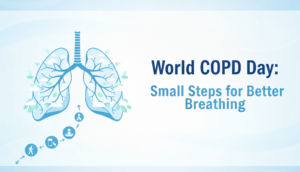Asthma is a chronic condition that affects millions of people worldwide. It causes your airways to narrow and swell, making it difficult to breathe. While asthma can be managed with proper care and medication, understanding and avoiding common asthma triggers is key to preventing flare-ups. If you’re struggling with asthma, learning how to manage these triggers can greatly improve your quality of life. Let’s dive into some of the most common asthma triggers and practical tips for managing them effectively.
What Are Asthma Triggers?
Asthma triggers are factors that can worsen your asthma symptoms, leading to flare-ups or asthma attacks. These triggers vary from person to person, but once identified, you can take steps to minimize your exposure and reduce the likelihood of an asthma attack. Working closely with your healthcare provider, like the specialists at an asthma treatment center, can help you pinpoint your specific triggers and develop a personalized asthma management plan.
Common Asthma Triggers
1. Allergens
Allergens such as pollen, pet dander, dust mites, and mold are some of the most common asthma triggers. When people with asthma come into contact with these allergens, it can inflame their airways, making breathing difficult.
2. Cold Air
Cold air can irritate the airways of individuals with asthma, causing them to tighten. During colder months, many people experience more frequent asthma symptoms.
3. Exercise
While regular exercise is beneficial for overall health, intense physical activity can cause exercise-induced asthma, especially in cold or dry conditions.
4. Smoke
Smoke from cigarettes, fireplaces, or outdoor pollution can severely aggravate asthma symptoms. Even secondhand smoke can be a powerful trigger for many asthma sufferers.
5. Strong Emotions
Believe it or not, intense emotions such as stress, anxiety, or laughter can cause shortness of breath and trigger asthma symptoms. Managing emotional triggers is an essential aspect of asthma care.
6. Respiratory Infections
Colds, flu, and other respiratory infections are common asthma triggers. These infections inflame your airways, making you more susceptible to asthma attacks.
7. Pollutants and Chemicals
Airborne chemicals, pollution, strong perfumes, and cleaning products can irritate the lungs and provoke asthma symptoms.
8. Food Additives
Certain preservatives and food additives, such as sulfites found in processed foods, wine, and dried fruits, can trigger asthma in sensitive individuals.
How to Manage Asthma Triggers
1. Identify Your Triggers
The first step in managing asthma is identifying your specific triggers. This can be done by keeping a journal of your symptoms and working closely with a healthcare provider. An asthma specialist can help you identify your triggers through pulmonary function tests.
2. Avoid Known Allergens
Once you know your asthma triggers, avoiding them becomes essential. For example:
- Pollen: Keep windows closed during high pollen seasons and use air purifiers.
- Dust mites: Wash bedding regularly in hot water and use dust-proof covers for mattresses and pillows.
- Mold: Keep humidity levels low in your home and clean any moldy areas promptly.
3. Control Your Environment
Asthma sufferers benefit greatly from controlling their indoor environment. This can involve:
- Using air purifiers: High-efficiency particulate air (HEPA) filters can help remove airborne allergens from your home.
- Ventilating your home properly: Make sure your home is well-ventilated to reduce the buildup of allergens and pollutants.
- Choosing asthma-friendly pets: If you’re allergic to pets, opting for hypoallergenic breeds or keeping pets out of bedrooms can minimize exposure.
4. Prepare for Cold Weather
Cold air is a common asthma trigger. To prevent cold weather-induced symptoms:
- Wear a scarf or mask over your nose and mouth to warm the air before it enters your lungs.
- Exercise indoors during colder months.
- Consider using a rescue inhaler before stepping outside in extremely cold weather.
5. Exercise Safely
While exercise is essential for maintaining overall health, people with asthma should take precautions:
- Warm up properly before exercising to prevent exercise-induced asthma.
- Choose low-impact activities like swimming, which are gentler on the lungs.
- Carry your rescue inhaler with you during physical activities, especially in cold or dry environments.
6. Avoid Smoke
Avoiding smoke, whether from cigarettes, fireplaces, or outdoor pollution, is one of the most crucial ways to manage asthma. If you’re a smoker, quitting is the best thing you can do for your lungs. If you live with a smoker, ask them to smoke outdoors to reduce exposure to secondhand smoke.
7. Manage Stress and Emotions
Since strong emotions can trigger asthma, learning how to manage stress is essential. Techniques such as deep breathing exercises, meditation, and yoga can help reduce stress and keep asthma symptoms in check.
8. Maintain Good Health
Preventing respiratory infections, such as colds and flu, is a key part of asthma management. Washing your hands regularly, getting vaccinated, and maintaining a healthy lifestyle can reduce the chances of getting sick and triggering an asthma attack.
9. Follow a Medication Plan
Using prescribed asthma medications, such as long-term control medicines and quick-relief inhalers, is crucial for managing asthma. These medications can help you prevent flare-ups and keep your symptoms under control. Regular follow-ups with your healthcare provider, like those available at DocDx, ensure that your treatment plan is working effectively.
10. Dietary Adjustments
Certain foods and additives can trigger asthma symptoms. Keep an eye on food labels, especially for sulfites, which are commonly found in dried fruits, processed foods, and wine. Eating a balanced, nutritious diet can also help strengthen your immune system, reducing your chances of illness.
The Importance of Professional Care
While identifying and managing your triggers is essential, working with a healthcare provider is key to ensuring you are on the right path to controlling your asthma. At a professional asthma treatment center, you can receive personalized advice, proper medications, and tests that help you understand your asthma better.
Your doctor can also monitor your asthma over time, adjusting your treatment plan as needed to ensure you stay healthy and symptom-free. Visiting an asthma specialist regularly can make a huge difference in the overall management of the condition.
Conclusion
Asthma triggers can vary from person to person, but knowing what aggravates your symptoms and taking steps to manage those triggers can greatly reduce flare-ups and improve your quality of life. Simple adjustments, such as improving your home environment, following a medication plan, and staying away from allergens, can keep asthma under control. If you’re unsure about your triggers or want professional advice, seeking care from an asthma treatment center is a great next step.
By understanding and managing your asthma triggers, you can take control of your condition and enjoy a healthier, more active life.



